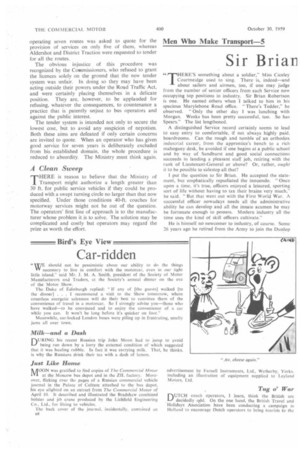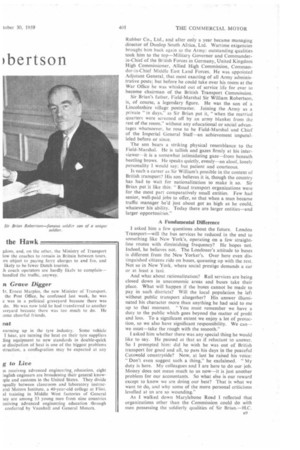Sir Briar
Page 42

Page 43

If you've noticed an error in this article please click here to report it so we can fix it.
)bertson
".HERE'S something about a soldier," Miss Ciceley
Courtneidge used to sing. There is, indeed—and about sailors and airmen, too, if one may judge from the number of senior officers from each Service now occupying top positions in industry. Sir Brian Robertson is one. He named others when I talked to him in his spacious Marylebone Road office. There's Tedder," he observed. "Only the other day I was lunching with Morgan. Weeks has been pretty successful, too. So has Spears." The list lengthened.
A distinguished Service record certainly seems to lead to easy entry to comfortable, if not always highly paid, boardrooms. Can the rough and tumble of an orthodox industrial career, from the apprentice's bench to a rich mahogany desk, be avoided if one begins at a public school and by way of Sandhurst and good social connections succeeds in landing a pleasant staff job, retiring with the rank of Lieutenant-General or above? Or, rather, ought it to be possible to sidestep all that?
I put the question to Sir Brian. He accepted the statement, but emphatically repudiated the innuendo. "Once upon a time, it's true, officers enjoyed a leisured, sporting sort of life without having to tax their brains very much," he said. "But that went out with the First World War. A successful officer nowadays needs all the administrative ability he can develop and all the innate acumen he may be fortunate enough to possess. Modern industry all the time uses the kind of skill officers cultivate."
He is himself no newcomer to industry, of course. Some 26 years ago he retired from the Army to join the Dunlop
Rubber Co., Ltd., and after only a year became managing director of Dunlop South Africa, Ltd. Wartime exigencies brought him back again to the Army: outstanding qualities took him to the top—Military Governor and Commanderin-Chief of the British Forces in Germany, United Kingdom High Commissioner, Allied High Commission, Commander-in-Chief Middle East Land Forces. He was appointed
Adjutant General, that most exacting of all Army administrative posts; but before he could take over his room at the War Office he was whisked out of service life for ever to become chairman of the British Transport Commission.
Sir Brian's father, Field-Marshal Sir William Robertson, is, of course, a legendary figure. He was the son of a Lincolnshire village postmaster. Joining the Army as a private "in days," as Sir Brian put it, when the married quarters were screened off by an army blanket from the rest of the room," without any educational or social advantages whatsoever, he rose to be Field-Marshal and Chief of the Imperial General Staff—an achievement unparalleled before or since.
The son bears a striking physical resemblance to the Field-Marshal. He is tallish and gazes firmly at his interviewer—it is a somewhat intimidating gaze—from beneath beetling brows. He speaks quietly, evenly—an aloof, lonely personality I would say; but patient and courteous.
Is such a career as Sir William's possible in the context of British transport? His son believes it is, though the country has had to wail for nationalization to make it so. Sir Brian put it like this: " Road transport organizations were for the most part comparatively small entities. Few had senior, well-paid jobs to offer, so that when a man became traffic manager he'd just about got as high as he could, whatever his ability. Today there are larger entities—and larger opportunities."
A Fundamental Difference I asked him a few questions about the future. London Transport—will the bus services be reduced in the end to something like New York's, operating on a few straightline routes with diminishing frequency? He hopes not. Indeed, he believes not. The Londoner's attitude to buses is different from the New Yorker's. Over here even distinguished citizens ride on buses, queueing up with the rest. Not so in New York, where social prestige demands a car or at least a taxi.
And what about rationalization? Rail services are being closed down in uneconomic areas and buses take their place. What will happen if the buses cannot be made to pay in such districts? Will the local population be left without public transport altogether? His answer illuminated his character more than anything he had said to me up to that moment. You must remember we have a duty to the public which goes beyond the matter of profit and loss. To a significant extent we enjoy a lot of protection, so we also have significant responsibility. We can— we must—take the rough with the smooth,"
I asked him whether there was any special thing he would like to say. He paused at that as if reluctant to answer. So I prompted him: did he wish he was out of British transport for good and all, to pass his days in the peaceful Cotswold countryside? Now, at last he raised his voice: "Don't even suggest such a thing," he exclaimed. "My duty is here. My colleagues and I are here to do our job. Money does not mean much to us now—it is just another problem for our accountants. So what else is our reward except to know we are doing our best? That is what we want to do, and why some of the more personal criticisms levelled at us are so wounding."
As I walked down Marylebone Road I reflected that organizations other than the Commission could do with men possessing the soldierly qualities of Sir Brian.—HC. a9




















































































































